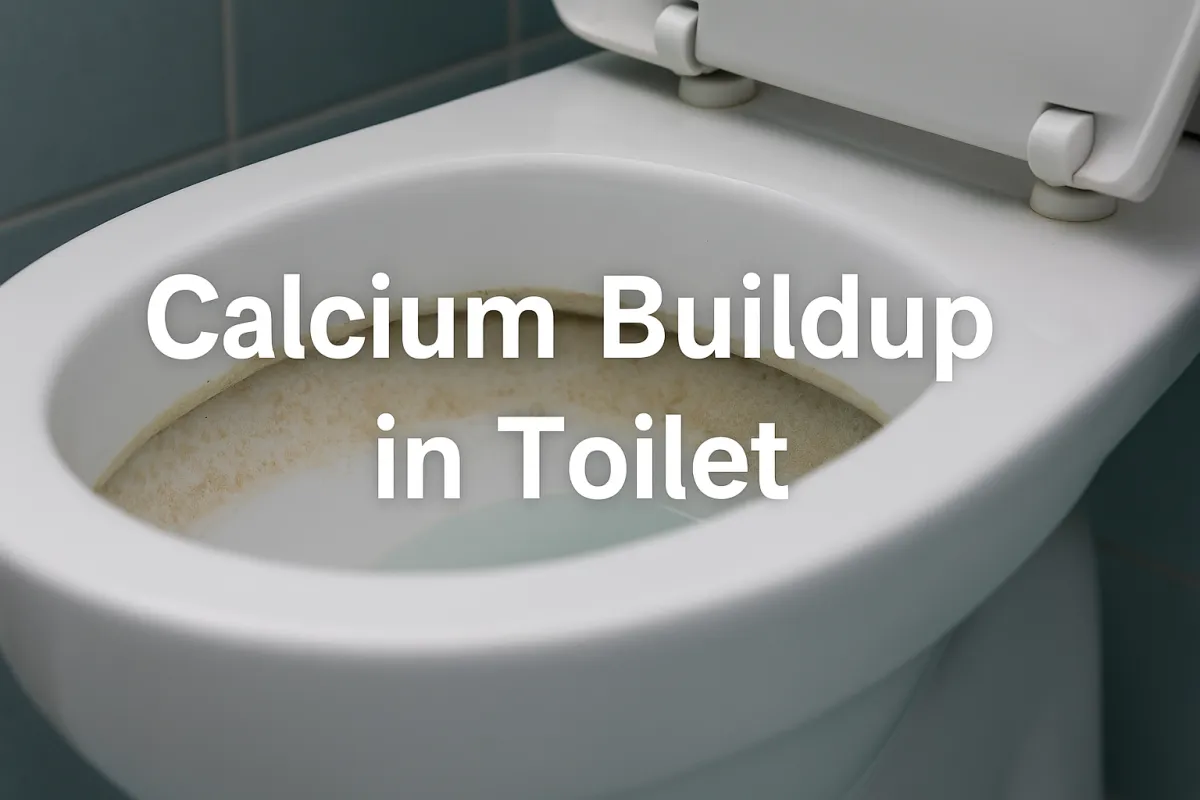
Calcium Buildup in Toilet: What It Is, Why It Happens, and How To Get Rid of It
Noticing white rings, crusty stains, or weak flushes in your toilet?
You’re probably dealing with calcium buildup.
It’s one of the most common issues in homes with hard water, especially here in Southern Manitoba.
And if you don’t deal with it early, it can lead to stubborn stains, clogs, and even plumbing damage.
The good news?
It’s fixable — with a few tools, some household items, or help from a local plumber if it gets out of hand.
Let’s break it down: what causes calcium buildup, how to remove it, what to use, and how to keep it from coming back.
What Causes Calcium Buildup in Toilets?
Calcium buildup, also known as limescale, comes from hard water.
That’s water with high levels of dissolved minerals — mostly calcium and magnesium.
As water sits in your toilet bowl or tank, those minerals slowly collect on the surface.
Over time, they harden into crusty deposits that cling to the porcelain.
Here’s what to look for:
White or brownish rings in the toilet bowl
Crusty buildup around the water line
Slower flush or partial flush
Gritty deposits under the toilet rim or in the tank
In Manitoba, hard water is pretty common — especially in rural areas or homes without a water softener.
So even if you clean regularly, that mineral buildup can sneak up on you.
How To Remove Calcium from a Toilet Bowl (Step-by-Step)
There’s no shortage of home remedies for toilet calcium deposits, but not all of them work.
Here are a few methods that actually do.
1. Vinegar and Baking Soda
This is a great first step — especially for mild calcium stains in the toilet.
Here’s what to do:
Pour about 2 cups of white vinegar into the bowl.
Add 1/2 cup of baking soda. Let it fizz.
After 10–15 minutes, scrub with a toilet brush.
Let it sit for a few more hours, then flush.
This method works best when the stains haven’t hardened too much.
2. Use a Pumice Stone (Gently)
Pumice stones can be super effective, but you need to be careful.
Make sure it’s wet before scrubbing to avoid scratching the porcelain.
Wet the pumice stone and the stained area.
Gently scrub in circles until the calcium buildup starts to lift.
Flush and rinse often.
Don’t use this on plastic or colored toilet surfaces — it’s meant for porcelain only.
3. Commercial Descaler or CLR
If home remedies don’t cut it, go for a calcium, lime, and rust remover (like CLR).
These are stronger and designed for mineral stains.
Follow the label instructions carefully.
Usually, you’ll need to pour the cleaner into the bowl and let it sit for 10–30 minutes.
Then scrub and flush.
Always wear gloves and ventilate the room when using chemical cleaners.
4. Don’t Forget the Toilet Rim and Tank
Most calcium buildup starts under the rim or inside the tank — places we forget to clean.
Use a mirror or a flexible brush to check these spots.
You can use vinegar, CLR, or tank tablets made for mineral control.
What To Use To Remove Calcium Build Up in Toilet Bowl
If you’re wondering what actually works, here are a few tried-and-true options:
Look for products labeled “safe for septic systems” if that applies to your home.
How To Prevent Calcium Stains in Toilet
Once you’ve cleaned up the buildup, keeping it away is a lot easier than you might think.
Clean With Vinegar Weekly
A quick vinegar flush once a week can stop calcium from sticking in the first place.
Install a Water Softener
If hard water is a recurring problem in your home, a softener can make a huge difference — not just for your toilet, but for your entire plumbing system.
Use Toilet Tank Tablets
These aren’t a fix, but they can help slow down buildup between deep cleans. J
ust avoid bleach-based ones if your toilet has metal parts inside the tank.
When To Call a Plumber
Some calcium buildup is too far gone for scrubbing or vinegar.
If your toilet:
Has low or uneven flushing
Backs up regularly
Shows buildup in places you can’t reach
Or if you’re just tired of dealing with it...
…then it’s time to bring in a pro.
At Trav’s Plumbing & HVAC LTD, we’ve helped homeowners across Southern Manitoba deal with hard water and stubborn mineral buildup.
Whether it’s a deep clean, pipe replacement, or installing a water softener, we’ve got the tools and experience to fix it fast.
Tired of Fighting Calcium Buildup?
Don’t let hard water ruin your toilet — or your patience.
If you’re dealing with stubborn stains, weak flushes, or buildup that keeps coming back, Trav’s Plumbing & HVAC LTD is here to help.
We serve homes across Southern Manitoba with expert plumbing services, toilet repairs, and solutions for hard water.
Give us a call or book online — we’ll help you flush the problem for good.
FAQs About Calcium Buildup in Toilets
How do I remove calcium from my toilet?
Try vinegar and baking soda first. For tougher stains, use a pumice stone or a chemical descaler like CLR.
What causes calcium stains in the toilet?
They’re caused by hard water. Over time, minerals like calcium and magnesium build up and harden inside the bowl or tank.
What’s the best thing to use to remove calcium build up in toilet bowl?
Vinegar, CLR, and pumice stones are all effective. Use vinegar for light stains, CLR for heavy buildup, and a pumice stone when scrubbing is needed.
Is calcium buildup bad for my toilet?
Yes. It can clog the rim jets, slow down flushing, and eventually cause leaks or damage inside the tank.
Can a plumber help with toilet calcium buildup?
Absolutely. If DIY methods don’t work or you’re dealing with recurring buildup, a plumber can help clear it and recommend ways to prevent it long-term.
